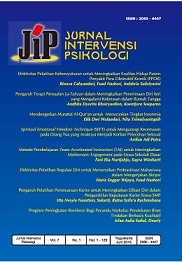Main Article Content
Abstract
Husband's infidelity is one of the existence of the cause of domestic violence resulting in low self-acceptance wife. LaTahzan forgiveness therapy aims to help the wife as the victim of violence to be able to break loose from negative feelings, improving both themselves and condition became more positive, and find a new purpose in life to get closer to Allah SWT as a God. Subjects in this study amounted to three wives who are victims of violence and infidelity. Data was collected through action research approach and use the scale self-acceptance, observation and interviews. Measurement of self-acceptance scale is performed three times that are before the intervention, after an intervention, and follow up by two weeks post intervention. The data used quantitative and qualitative. Quantitative analysis is used, based on measurements on a scale of self-acceptance. Qualitative analysis was conducted based on the outcome document of observations and interviews during the assessment phase to the follow-up phase. The results showed that the La-Tahzan Forgiveness therapy can provide a change towards a better subject in an effort to increase self-acceptance wife who experienced domestic violence.
Keywords: La-Tahzan Forgiveness Therapy, domestic violence, Self-Acceptance,Infidelity
Article Details
Authors who publish with this journal agree to the following terms:
- Authors retain copyright and grant the journal right of first publication with the work simultaneously licensed under a Creative Commons Attribution-ShareAlike 4.0 International License that allows others to share the work with an acknowledgment of the work's authorship and initial publication in this journal.
- Authors are able to enter into separate, additional contractual arrangements for the non-exclusive distribution of the journal's published version of the work (e.g., post it to an institutional repository or publish it in a book), with an acknowledgment of its initial publication in this journal.
- Authors are permitted and encouraged to post their work online (e.g., in institutional repositories or on their website) prior to and during the submission process, as it can lead to productive exchanges, as well as earlier and greater citation of published work (See The Effect of Open Access).




